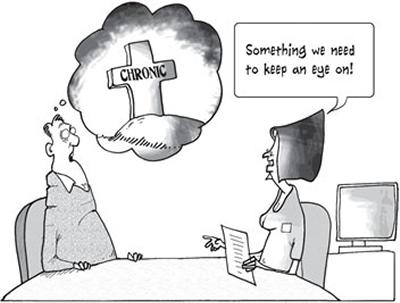Is laughter the best medicine? Cartoons could help patients cope with their chronic conditions

Researchers from the University of Southampton have shown that cartoons could be a beneficial way of educating patients and empowering them to cope better with their long term conditions.
"Humour is frequently and naturally used by people with chronic illnesses to help them adjust and understand what is happening to them," explains Associate Professor Dr Anne Kennedy, who led the study. "Our study has shown that cartoons could provide clarity to patients and be a way to engage with them. It is an untapped resource and could be a potential approach to support self-management."
Cartoons are already used in patient information but the content is sourced from health professionals rather than directly from patient experience, a unique aspect of the Southampton study.
Published in the Health Services Research journal, the study was carried out under the auspices of National Institute for Health Research Collaboration for Leadership in Applied Health Research and Care (NIHR CLAHRC) Wessex and Greater Manchester. Researchers used patient feedback to create a series of cartoons which demonstrated common experiences, problems and anxieties. The cartoons were incorporated into a guidebook given to patients who have chronic kidney disease. These patients were asked their opinion on the use of cartoons and humour in regular patient information and then asked to evaluate the cartoons drawn for the guidebook.
Results showed a range of feelings towards the cartoons including amusement, recognition, hostility and incentives to action. Overall patients found the cartoons useful in lightening the tone of information and gave patients insight and understanding they had not had before.
Dr Kennedy says health professionals could use the cartoon approach to help their patients engage more in the management of their own conditions.
She says: "Cartoons can be challenging and the difficult emotional responses some pictures evoke could be used to help people adjust to their situation, but they can also be used to dispel misconceptions. The word chronic is often misinterpreted as meaning terminal - reaction to the particular cartoon that demonstrated ‘chronic' did prove a bit shocking to some patients but it allowed the word to be talked through and it was a tipping point for patients to better understand what their condition was."
Professor Anne Rogers, NIHR CLAHRC Wessex Research Director, who also worked on the study, adds: "Cartoons, drawn with patient input, have potential to help communicate important advice and help patients self-manage their conditions while boosting moral. More work needs to done in this area to build on our findings and we hope that this knowledge will be used to develop cartoons that reflect patients, experiences and get them thinking about where they can get support to suit their needs."
Notes for editors
1. Cartoon attached depicts the different ways the word ‘chronic' is interpreted. More cartoon images are available from Media Relations upon request. All images must be credited with ‘Cartoon courtesy of Fran Orford'.
2. The paper can be viewed at http://www.ncbi.nlm.nih.gov/pmc/articles/PMC3945740/ or is available from Media Relations upon request,
3. The University of Southampton is a leading UK teaching and research institution with a global reputation for leading-edge research and scholarship across a wide range of subjects in engineering, science, social sciences, health and humanities.
With over 23,000 students, around 5000 staff, and an annual turnover well in excess of £435 million, the University of Southampton is acknowledged as one of the country's top institutions for engineering, computer science and medicine. We combine academic excellence with an innovative and entrepreneurial approach to research, supporting a culture that engages and challenges students and staff in their pursuit of learning.
The University is also home to a number of world-leading research centres including the Institute of Sound and Vibration Research, the Optoelectronics Research Centre, the Web Science Trust and Doctoral training Centre, the Centre for the Developmental Origins of Health and Disease, the Southampton Statistical Sciences Research Institute and is a partner of the National Oceanography Centre at the Southampton waterfront campus. www.southampton.ac.uk
For more information contact:
Becky Attwood, Media Relations Officer, University of Southampton, 023 8059 5457, 07545 422512, or r.attwood@soton.ac.uk
Follow us on twitter: http://twitter.com/unisouthampton
Follow me on twitter: http://twitter.com/beckyattwood07
Like us on Facebook: www.facebook.com/unisouthampton